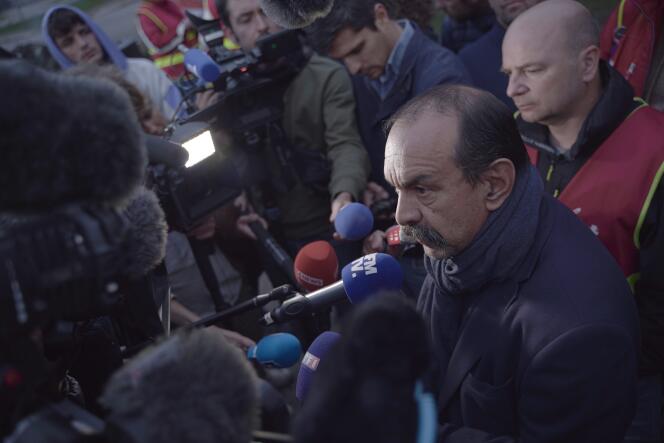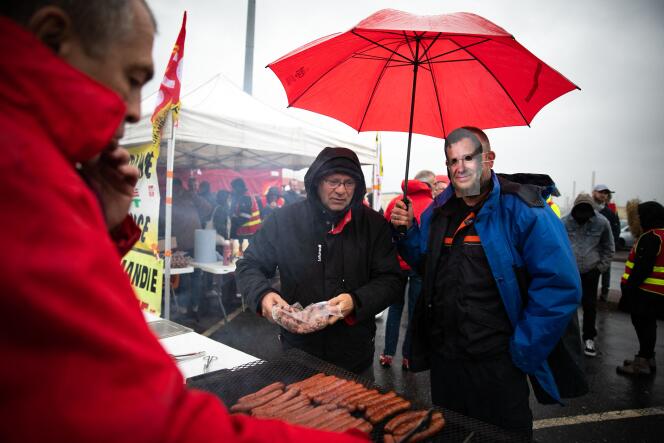The French government is hoping that the fuse goes out before it lights the powder keg. Over two weeks since the first strikes began at oil refineries, the government is facing a further risk: the possibility of industrial action spreading to other sectors. Ever since four striking workers from the ExxonMobil refinery in Notre-Dame-de-Gravenchon (northern France) were ordered back to work on Wednesday 12 October, signs have appeared across France, where fuel shortage is becoming a reality. "This strike has to spread," said Emmanuel Lépine, secretary general of the chemical industries branch of the CGT union, the next day. The government is keeping a close eye.
For now, there is no sign of matters calming down. Industrial action at the refineries has led to calls for wide protests. On Thursday evening four unions – CGT, Force Ouvrière (FO), FSU, and Solidaires – and four youth organizations – FIDL, MNL, UNEF, and La Voix Lycéenne – called for a general strike on Tuesday to demand "higher wages and to defend the right to strike." Transport workers and civil servants are expected to strike. In particular, the SNCF (the French rail network operator) and the Paris public transport network will be on strike. This decision was made after a meeting held at the CGT's national headquarters.

This powerhouse union led by Philippe Martinez, now at the forefront of industrial action, has formed an alliance with Force Ouvrière. This organization, which had distanced itself for several months from CGT, decided to join forces again after strikers at the refineries were ordered back to work. "This was the trigger," admitted Patricia Drevon, FO's confederate secretary, commenting that many of her colleagues were shocked by the government's decision which, in their opinion, violates the right to strike. On French news channel BFM-TV on Thursday morning, Mr. Martinez declared that the government "screwed up" with its use of back-to-work orders. "The strikes need to become more widespread," he insisted.
The challenge for union leaders
The union leaders involved in the protest do realize that they are taking a gamble by calling for a national day of action less than three weeks after the September 29 demonstrations, which focused on the cost-of-living crisis. But they believe that "something is afoot" in the country, according to Simon Duteil, co-delegate general of Solidaires. Apart from the fuel sector, other sectors are under pressure, particularly the energy sector. For several weeks now, walk-outs demanding better wages have been disrupting activity at several nuclear power plants. In the long run, these disputes could make French energy company EDF's efforts to avoid power cuts over the winter more complicated.
Given the risk, the government has to work on several fronts at the same time. Its primary objective remains to contain the fire where it started. First, by unblocking fuel supply. On Thursday, back-to-work orders were given at the TotalEnergies oil depot near Dunkirk (northern France). By midday, strikers at one of the two Esso-ExxonMobil refineries, in Fos-sur-Mer (southern France) voted to lift the blockade. On Friday the CFDT union representative involved in wage talks at TotalEnergies announced that a compromise had been reached overnight, but not yet signed, for a 7% salary bump. However, the CGT union has left the negotiation and promised to continue with strike action. Five out of seven refineries in France are still shut down, as well as several depots, including a huge one near Dunkirk, belonging to TotalEnergies.
Caught up in this crisis, French President Emmanuel Macron and his ministers have slowly shifted strategy and started to raise their voices at Total's management. On Wednesday evening, during an interview broadcast on French public television France 2, Mr. Macron himself spoke of "massive profits, lots of money distributed to shareholders, and the delay in starting negotiations with employees." "They have the capacity, and therefore the duty, to raise all their employees' wages in line with proportions negotiated with the labor unions," said Economy Minister Bruno Le Maire, on French radio RTL, on Thursday morning.

Within the government, several sources believe that the French energy company has been less constructive than Esso-ExxonMobil from the outset. Prime Minister Elisabeth Borne and Minister of Energy Transition Agnès Pannier-Runacher have been in regular contact with Total's CEO. Despite the government repeatedly saying that it did not want to interfere, the "dozens of text messages and numerous phone calls" are not only intended to speed up negotiations but also to get company management to back down on wage demands. If they manage to end the deadlock at the refineries, the presidency is hoping that this will put an end to any spillover strikes.
The French are very divided
The government is also examining public opinion. Even though surveys show that the French are very divided on whether they will support the movement, many ministers fear that the industrial disputes will zoom in on the issue of wages and redistribution. For months, Mr. Le Maire has been advocating for negotiations within companies. While raises have been granted to civil servants (+3.5% on July 1), pensioners (+4% for the basic plan in September), and to the minimum wage to take account of inflation, rising prices (+5.6% in September) continue to climb and erode purchasing power. To mitigate these effects, the government is counting on measures to limit increases in energy prices (gas, electricity, rebates, etc.) or the "Macron bonus" [a bonus of up to 3,000 euros that employers can give their workers, exempt from social withholdings], which is only available to certain employees. Not enough to eliminate concerns.
Left-wing opposition parties, including La France Insoumise (LFI) leader Jean-Luc Mélenchon's supporters, have pounced on the issue. They are holding a "march against the cost-of-living crisis and climate inaction" on Sunday in Paris. "These protests lead to social breakthroughs. It's time to play tough," said Clémentine Autain, LFI MP, on France 2 on Thursday.
While the LFI MP François Ruffin stood alongside Total employees in Gonfreville-l'Orcher (northern France) and the president of the LFI parliamentary group, Mathilde Panot, spoke in front of the Gravenchon refinery, those close to President Macron denounced a form of collusion between the CGT and LFI, saying they are united by the desire to bring down the government. But this social upheaval also makes things tricky for the government's agenda, which is becoming increasingly cautious. Even though many majority MPs wanted to move quickly, the use of Article 49.3 of the Constitution [allowing the government to pass a bill without a vote at the Assemblée Nationale] to pass the budget has been postponed until early next week. This is to allow for parliamentary debate and to avoid giving the impression of pushing the bill through before the protests on Sunday.
Within the majority, this news also resurrects debates that did not go down too well, for example, the one on taxing windfall profits. Despite certain multinationals, such as TotalEnergies, having made more than €10.4 billion in profits in the first half of 2022, the finance ministry and the president's office have always brushed aside the idea of a windfall tax, preferring the future European mechanism of a "temporary solidarity contribution". But many MPs would like to send a stronger message to the public. A budget amendment from the Macron-allied party MoDem providing for a temporary increase in the taxation of "super dividends" was adopted (227 votes for, 88 against), on Wednesday night, thanks in particular to the support from the left and the far right. It also received the support of 19 of Macron's MPs.
The finance ministry did not appreciate this outcome. In this very shifting context, Prime Minister Borne will be meeting throughout the week-end with parliamentary group presidents to discuss the future pension reform. Another highly touchy issue.